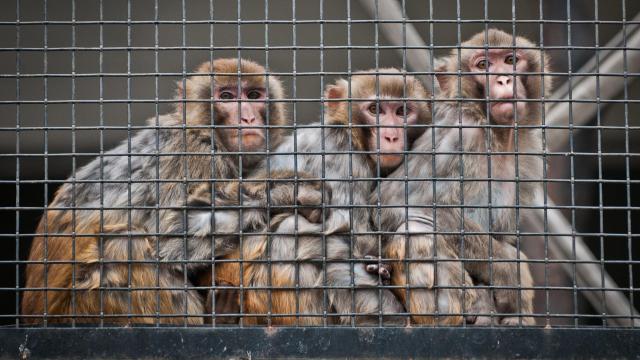Neuralink is facing new allegations of malpractice from animal rights advocacy group, Physicians Committee for Responsible Medicine (PCRM). The organisation claims that the Elon Musk-owned biotech company improperly and illegally transported hazardous materials, potentially contaminated with dangerous primate pathogens, according to documents obtained through a public records request.
In a report from Reuters, PCRM told the outlet it sent a letter on Thursday outlining Neuralink’s alleged violations and relevant supporting evidence to the Department of Transportation — the U.S. agency responsible for regulating and overseeing the transport of hazardous materials. In the letter, the animal-welfare group requests that the DOT look into Neuralink’s activity and issue fines for violations.
“The company’s documented track record of sloppy, unsafe laboratory practices compel DOT to investigate and levy appropriate fines,” PCRM wrote.
The hazardous materials in question: Neuralink devices implanted and later removed from the brains of rhesus monkeys who may have been infected with multiple pathogens. PCRM’s account primarily focuses on “Animal 13″ a female macaque with two Neuralink implants inserted in its brain. Following the insertion surgery, Animal 13 developed an apparent infection, according to documents obtained by PCRM from UC Davis via public records request. (UC Davis formerly collaborated with Neuralink, but ended that partnership in 2020, according to the university.)
Neuralink researchers attempted to treat Animal 13’s infection, and then later killed the monkey — as is standard in animal testing trials. The Neuralink device was removed and a necropsy examination revealed that Animal 13 was infected with multiple pathogens including an antibiotic-resistant form of staph, and a form of bacterial pneumonia. As a rhesus macaque, the monkey may have also been infected with herpes B, a virus for which the species is a natural reservoir that can cause severe brain damage and death in humans in the rare instance that transmission occurs, according to the CDC.
Emails exchanged between UC Davis and Neuralink personnel, and included in PCRM’s letter, appear to indicate that the unsterilized, contaminated device removed from Animal 13 in March 2019 was transported from UC Davis’ primate facility to a Neuralink facility by someone without the proper hazardous materials training. Further, the emails suggest that the contaminated device was not packaged properly during transport or subsequent storage.
The documents provided by PCRM also reference at least two later cases of devices removed from infected monkeys, also from 2019. In those instances, it seems the devices were transported by properly trained personnel, but that they still may not have been packaged according to the relevant safety standards. An email from an unidentified UC Davis employee describes all three devices as having “made their way back on site in an open box with no secondary container.” The email goes on to explain that, “Ultimately, we the Primate Centre [redacted] are at risk for this re-entrance of uncontained, monkey contaminated hardware…This is an exposure to anyone coming in contact with the contaminated explanted hardware and we are making a big deal about this because we are concerned for human safety.”
The documents provided by PCRM don’t catalogue any resulting instances of human harm from Neuralink’s alleged negligence. But failing to properly manage hazardous materials is illegal in its own right, and violators can face civil penalties of about $US100,000 ($138,820) per incident.
For context: There are extensive laws in place dictating how potentially infectious materials like medical waste and blood samples need to be transported, to minimise the safety risk. Hardware collected from inside the brains of disease-carrying monkeys falls under that umbrella of regulated, hazardous stuff. And an “open box” doesn’t generally cut it when it comes to storing something contaminated with an infectious pathogen.
If it yields a probe, PCRM’s request for DOT intervention likely wouldn’t be Neuralink’s first federal rodeo. The company is already facing scrutiny for alleged animal welfare violations. Neuralink, which has a stated goal of creating devices to help people with disabilities regain motor control or even lost vision, is under USDA investigation for mistreatment of monkeys and other animals used in testing, according to a separate Reuters report from last year. That official probe was prompted by another PCRM complaint.
Earlier in 2022, the advocacy group filed a lawsuit against UC Davis for its involvement in Neuralink experiments, alleging that the company’s animals were subject to horrific conditions amounting to torture. Neuralink has previously denied animal welfare violations and said it is, “absolutely committed to working with animals in the most humane and ethical way possible.”
Gizmodo reached out to Neuralink, DOT officials, and UC Davis with questions about PCRM’s most recent complaint, but did not immediately receive a response. From Reuters: “A UC Davis spokesperson would only say that the university abides by all biohazard and lab safety regulations.”
Though Musk has set big goals for Neuralink, the company has yet to deliver on its lofty promises. In a “show and tell” demonstration in December 2022, the CEO offered little in the way of news. In 2021, Neuralink released a video allegedly showing a monkey with a Neuralink implant playing a game of Pong “telepathically.” However, as pointed out in a New York Times report, though it might seem impressive, that demo is effectively just a repeat of an experiment from nearly 20 years ago. Neuralink has repeatedly missed its self-set deadlines for entering human trials.
